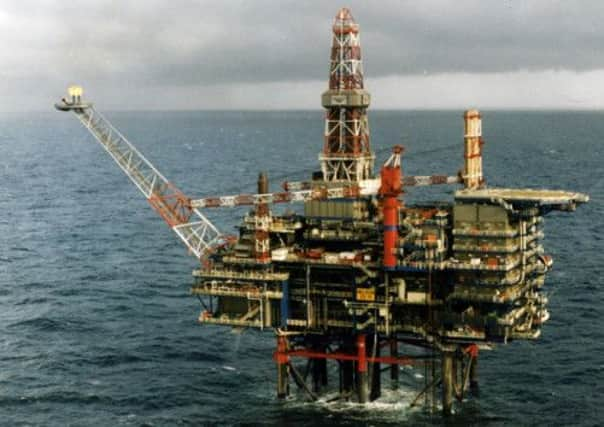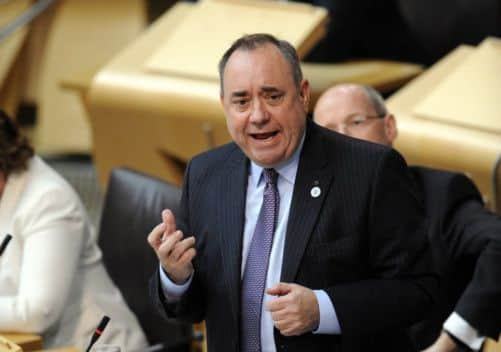Scottish independence: SNP sweeten deal for big oil


• Scottish Government announces commission on maximising oil and gas reserves
• Funds from oil to be “bonus”, say government
• Alex Salmond accused of ‘deliberately confusing’ value and tax take from resources
Advertisement
Hide AdAdvertisement
Hide Ad

In a major paper on the oil and gas industry in an independent Scotland, the Scottish Government said that, after a “yes” vote, there would be no higher taxes on North Sea firms, which could also expect to be told in advance of any planned reforms by the government.
On the long-term future of North Sea oil, the First Minister insisted that the country was “less than halfway” through pumping the value of the natural resource, saying that a further £1.5 trillion lay beneath the sea.
“With Westminster having squandered the opportunities of the first half, it’s up to us to make a better job of the second half,” he declared, as he described the oil cash remaining as a “bonus” for the future.
However, the proposal was described by critics as a deal “too good to be true”, as a detailed rebuttal from the Treasury said Mr Salmond’s estimates were some 12 times the official figures provided by the Office for National Statistics.
Pro-UK figures said Mr Salmond was “deliberately confusing” the wholesale value of oil and gas with the likely tax revenues that will flow to government.
Meanwhile, a leading independent think-tank said that Mr Salmond’s description of North Sea oil as a “bonus” to the Scottish economy did not stand scrutiny, given the fact that a future Scottish Government would need most, if not all, of its tax revenues to maintain current spending on services.
The paper declared that the oil industry after independence could rely on a more stable and business-friendly government than its UK counterpart.
It raised the idea that a future Scottish Parliament should create a law enshrining the right of oil and gas firms to be consulted on any changes to tax or regulation that concerns them. It also offers a guarantee that billions in tax relief on the cost of decommissioning rigs over the coming decades will be honoured too.
Advertisement
Hide AdAdvertisement
Hide AdThe paper also commits a future independent government to providing incentives to ensure firms can turn a profit and keep pumping.
Speaking on the BBC yesterday, Mr Salmond said: “Yes, we are past halfway in terms of production, but we are less than halfway in terms of value.” He claimed that on a forecast of $100 a barrel, “the remaining value of the resource is one and a half trillion pounds … to put it into everyday terms, that’s £300,000 for every man, woman and child in Scotland.”
Pressed on whether he would set up an “oil fund”, in which revenues would be saved up rather than spent, Mr Salmond said that he backed the “principle” of the idea but it would be set up “when fiscal conditions allow”.
The Glasgow University-based Centre for Public Policy for Regions (CPPR) responded yesterday by warning that there would be little or no money left over at present “without tax increases or budget cuts”. It declared that Scotland would initially “be heavily reliant on the taxes from the oil-based part of its economy in order to fund current levels of government spending”.
The CPPR challenged Mr Salmond’s claims that the UK government had underplayed future oil projections, saying that medium-term forecasts by the UK had been “overly optimistic”.
John McLaren: Broad picture is promising, but the devil is in the detail
THE latest briefing by the Scottish Government makes the case for an independent Scotland that is not dependent on North Sea oil but that can treat it as a substantial and welcome bonus to the onshore economy. However, close inspection reveals very little to bolster this argument.
The paper correctly points out that the onshore Scottish economy has been performing in a very similar manner to that of the UK for some time. But it is important to differentiate between the output of an independent Scotland and what level of public spending that output would allow for, based on current rates of taxation.
Advertisement
Hide AdAdvertisement
Hide AdEven if Scottish tax revenues, per head, are roughly in line with those for the UK, Scotland’s spending per head on government services is still well above the UK average. Within the UK, this higher spending is met by a funding allocation system. Outside of the UK, this “extra” funding source would disappear, to be replaced by offshore, North Sea, tax revenues.
At present, North Sea revenues are of such a scale as to pretty much match what is otherwise received from being part of the UK. In the future, it could be higher or lower. However, as production is on a long-term declining trend, the downside risks over such revenues prevail. This implies that North Sea taxes are not a “bonus” but an essential part of post-independence funding.
It also implies that no surplus oil tax revenues are available for a sovereign (oil) fund, or at least not without tax increases or budget cuts.
What was missing from the paper was any further clarification on how exactly the current Scottish Government would deal with North Sea tax revenues post independence; will it save them or use them now to fill the funding gap that arises from leaving the UK? It is difficult to answer but that is all the more reason why a convincing answer is needed.
• John McLaren is an economist at the Centre for Public Policy for Regions
READ MORE